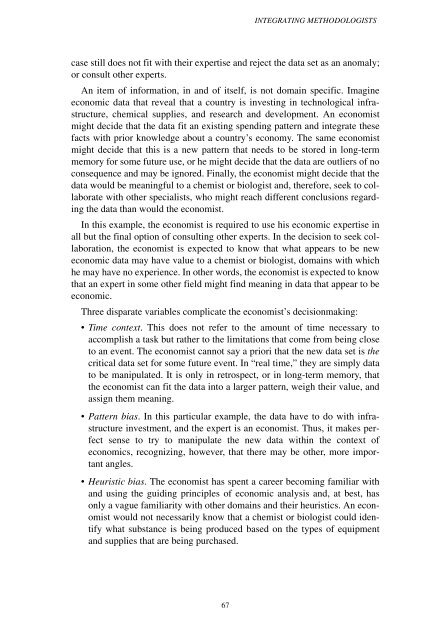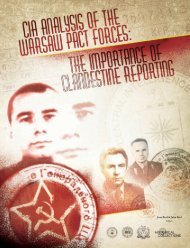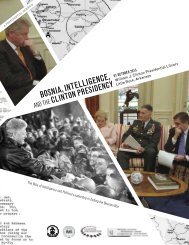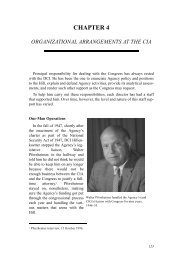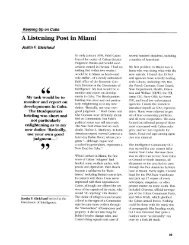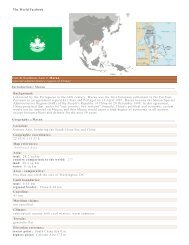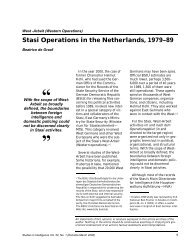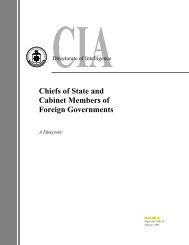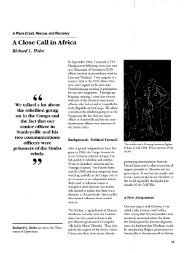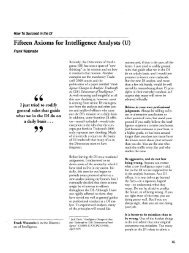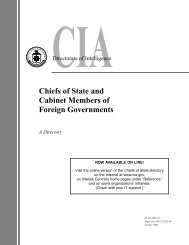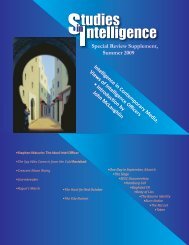Analytic Culture in the U.S. Intelligence Community (PDF) - CIA
Analytic Culture in the U.S. Intelligence Community (PDF) - CIA
Analytic Culture in the U.S. Intelligence Community (PDF) - CIA
You also want an ePaper? Increase the reach of your titles
YUMPU automatically turns print PDFs into web optimized ePapers that Google loves.
INTEGRATING METHODOLOGISTS<br />
case still does not fit with <strong>the</strong>ir expertise and reject <strong>the</strong> data set as an anomaly;<br />
or consult o<strong>the</strong>r experts.<br />
An item of <strong>in</strong>formation, <strong>in</strong> and of itself, is not doma<strong>in</strong> specific. Imag<strong>in</strong>e<br />
economic data that reveal that a country is <strong>in</strong>vest<strong>in</strong>g <strong>in</strong> technological <strong>in</strong>frastructure,<br />
chemical supplies, and research and development. An economist<br />
might decide that <strong>the</strong> data fit an exist<strong>in</strong>g spend<strong>in</strong>g pattern and <strong>in</strong>tegrate <strong>the</strong>se<br />
facts with prior knowledge about a country’s economy. The same economist<br />
might decide that this is a new pattern that needs to be stored <strong>in</strong> long-term<br />
memory for some future use, or he might decide that <strong>the</strong> data are outliers of no<br />
consequence and may be ignored. F<strong>in</strong>ally, <strong>the</strong> economist might decide that <strong>the</strong><br />
data would be mean<strong>in</strong>gful to a chemist or biologist and, <strong>the</strong>refore, seek to collaborate<br />
with o<strong>the</strong>r specialists, who might reach different conclusions regard<strong>in</strong>g<br />
<strong>the</strong> data than would <strong>the</strong> economist.<br />
In this example, <strong>the</strong> economist is required to use his economic expertise <strong>in</strong><br />
all but <strong>the</strong> f<strong>in</strong>al option of consult<strong>in</strong>g o<strong>the</strong>r experts. In <strong>the</strong> decision to seek collaboration,<br />
<strong>the</strong> economist is expected to know that what appears to be new<br />
economic data may have value to a chemist or biologist, doma<strong>in</strong>s with which<br />
he may have no experience. In o<strong>the</strong>r words, <strong>the</strong> economist is expected to know<br />
that an expert <strong>in</strong> some o<strong>the</strong>r field might f<strong>in</strong>d mean<strong>in</strong>g <strong>in</strong> data that appear to be<br />
economic.<br />
Three disparate variables complicate <strong>the</strong> economist’s decisionmak<strong>in</strong>g:<br />
• Time context. This does not refer to <strong>the</strong> amount of time necessary to<br />
accomplish a task but ra<strong>the</strong>r to <strong>the</strong> limitations that come from be<strong>in</strong>g close<br />
to an event. The economist cannot say a priori that <strong>the</strong> new data set is <strong>the</strong><br />
critical data set for some future event. In “real time,” <strong>the</strong>y are simply data<br />
to be manipulated. It is only <strong>in</strong> retrospect, or <strong>in</strong> long-term memory, that<br />
<strong>the</strong> economist can fit <strong>the</strong> data <strong>in</strong>to a larger pattern, weigh <strong>the</strong>ir value, and<br />
assign <strong>the</strong>m mean<strong>in</strong>g.<br />
• Pattern bias. In this particular example, <strong>the</strong> data have to do with <strong>in</strong>frastructure<br />
<strong>in</strong>vestment, and <strong>the</strong> expert is an economist. Thus, it makes perfect<br />
sense to try to manipulate <strong>the</strong> new data with<strong>in</strong> <strong>the</strong> context of<br />
economics, recogniz<strong>in</strong>g, however, that <strong>the</strong>re may be o<strong>the</strong>r, more important<br />
angles.<br />
• Heuristic bias. The economist has spent a career becom<strong>in</strong>g familiar with<br />
and us<strong>in</strong>g <strong>the</strong> guid<strong>in</strong>g pr<strong>in</strong>ciples of economic analysis and, at best, has<br />
only a vague familiarity with o<strong>the</strong>r doma<strong>in</strong>s and <strong>the</strong>ir heuristics. An economist<br />
would not necessarily know that a chemist or biologist could identify<br />
what substance is be<strong>in</strong>g produced based on <strong>the</strong> types of equipment<br />
and supplies that are be<strong>in</strong>g purchased.<br />
67


